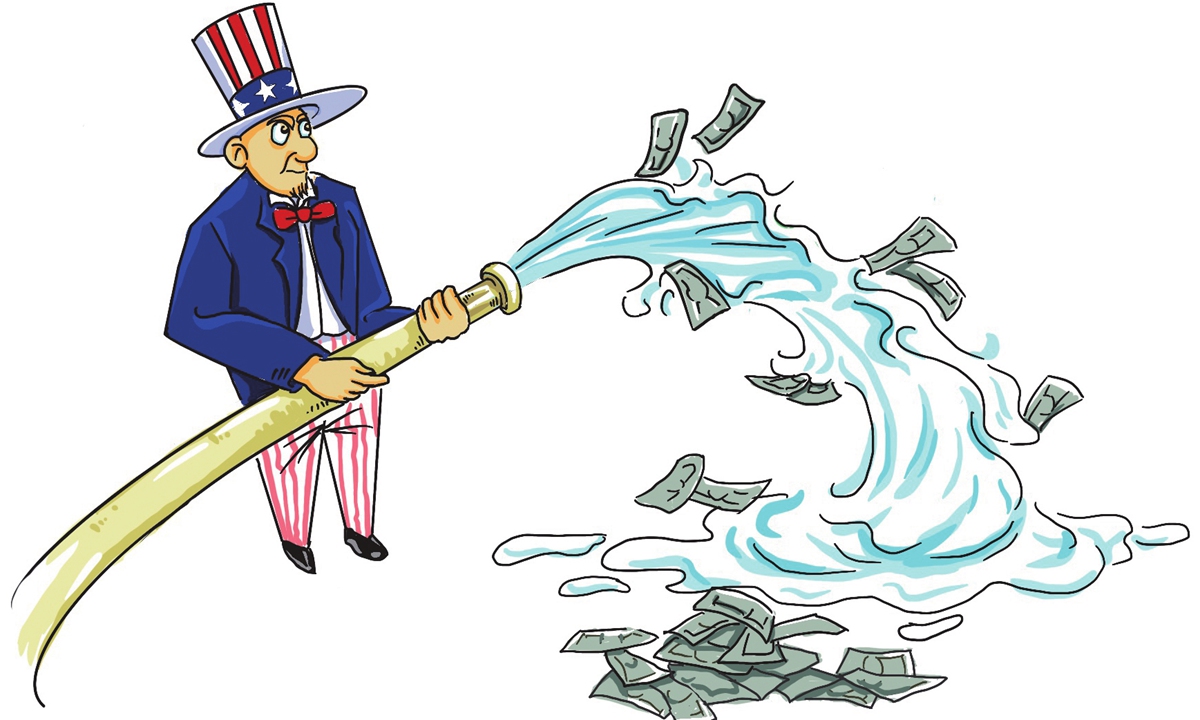China doesn't need Western high-liquidity stimulus plans
By Yao Yang Source:Global Times Published: 2020/6/10 21:02:14

Illustration: Tang Tengfei/GT
China has announced its annual macro-economic policy outline, which recommends implementing the policy focused on people's livelihoods and employment, rather than Western countries' large-scale stimulus plans.
The 1 trillion yuan ($141 billion) of national debt and 1 trillion yuan of special national debt newly issued by the central government to fight the pandemic will go directly to cities and counties. As for monetary policy, this year's Government Work Report stressed precise facilitation, with funds going directly to small, medium and micro-sized businesses that have been severely hit by COVID-19.
Compared to Western countries' trillions of dollars worth of stimulus plans, China, based on favorable economic fundamentals, has adopted prudent fiscal and monetary policies for post-pandemic economic recovery.
Before the pandemic, China's economic growth rate had already set off on a rapid recovery path, which will not be reversed by the virus. The Chinese economy is seeing stable resumption as the nation has generally brought the virus under control. The consumption indicator, which dropped furthest in the first quarter, reversed its direction in May.
The country's economy has shown signs of a V-shaped recovery, and a yearly positive growth is achievable so long as the country doesn't see a large-scale resurge in infections in the second half of the year.
Stabilizing employment and people's livelihoods through tailored measures to support citizens after the epidemic could also boost social consumption and create demand for enterprises. The most urgent problem companies now face is insufficient orders, which cannot be effectively solved in the short-term by expanding liquidity or investing in time-consuming infrastructure projects. Consumption coupons and cash subsidies are the most effective way to fix this problem.
By contrast, massive monetary easing in Western countries is a recipe for disaster. In the wake of the US stock market rout, the US Fed has provided up to $6 trillion in liquidity through a series of measures and expanded its balance sheet by more than $1 trillion through open market operations.
The massive liquidity goes first toward supporting the US government in issuing more debt. Increased liquidity has lowered interest rates and made it cheaper for the US government to issue debt. It will also enter the US stock and corporate bond markets, to maintain the entire financial system's false boom. American investors have little interest in manufacturing. Instead, they prefer to put their money into high-return financial activities.
The added liquidity also goes to meeting the hedge needs of foreign capital, as the US capital market, with its strong foundation, has been a shelter for foreign funds when the global economy encounters turbulence.
In the short run, the injected liquidity will lead to two results. Globally, the US will divert its burden to everyone else, and use other countries' savings to boost its own consumption. Domestically, Wall Street will conduct a massive reverse redistribution of wealth and income in the US, making those who own assets richer and those without assets poorer.
In the long run, the liquidity will not only increase the US government's debt to its people, but also to the world. At present, the US could still reduce its debt burden with more dollars, but at some point that method will fail and it will have to pay with real assets.
The Chinese government, on the other hand, has clearly adopted prudent fiscal and monetary policies which are correct and necessary. Resuming the economy after the epidemic through measures stabilizing employment and people's livelihoods is clearly the best option. There's no need for China to follow Western countries' large-scale stimulus plans.
The author is dean of the National School of Development at Peking University. bizopinion@globaltimes.com.cn
Posted in: EXPERT ASSESSMENT,CHINA-US